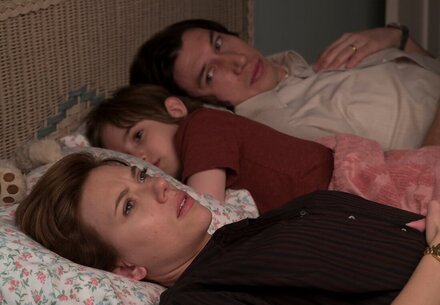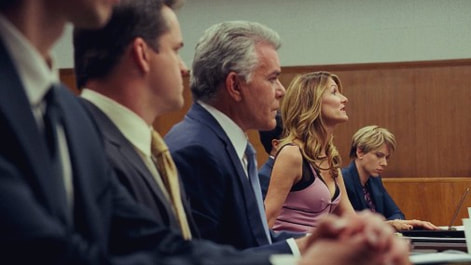A | A couple and their young son weather a difficult divorce. Directed by Noah Baumbach Starring Adam Driver and Scarlett Johansson Review by Jon Kissel |

After this serving of cognitive dissonance, things become increasingly clear. As Baumbach’s surrogate, it’s perhaps inevitable that the film would more fully understand Charlie’s part in the divorce. The film doesn’t suggest a kind of fatally flawed union between the two, and because it doesn’t, there must be a point of no return. In Nicole’s telling, she laid one down and Charlie steps over it, sealing the deal. She had long been hinting at wanting to move away from his company and into something that’s her own, but Charlie was belittling and noncommittal in a way that sounds like he hoped she would forget about the request. If he had been more excited about opportunities that arose for Nicole, they might have stayed together. Not only does she say this, but she and lawyer Nora Fanshaw (Laura Dern) convince Charlie’s lawyer Bert Spitz (Alan Alda) of it as well. The film further stacks the deck against Charlie by making their young son Henry (Azhy Robertson) take to LA in a way that Charlie seems incapable of, and by having his replacement lawyer Jay Marotta (Ray Liotta) scold Charlie in court. Charlie also cheated on Nicole with someone in the company. This underserves Nicole by all but absolving her part in things, excepting the oblique point, maybe, that she was too passive and let her frustrations build up to an untenable level, but the case against Charlie feels airtight.

It’s in this last part that Marriage Story hits the hardest. Fanshaw tells Nicole that what she’s doing is an act of hope, and because she’s the one that wants her life to change, that feels true. For Charlie, however, he didn’t imagine anything changing in his life, and the reconciliation of the plan he had for his family and where he finds himself in the present is the source of all the film’s emotional punches. Nicole’s praise letter described him as a natural leader. Part of leading is vision and in trying to lead his family, he couldn’t imagine a life anywhere else until it’s too late. He keeps insisting that they’re a New York family long after it’s apparent that is not going to be the case, and his face and his plans finally crumple in a sad office in Fanshaw’s building. His failure keeps him blinkered for longer than it should, and the film’s big showstopper scene of a blowout fight is rooted in that same lack of imagination. It takes him saying vicious things to Nicole to finally snap him out of it. The last we see of him in New York is Driver’s potentially Oscar winning scene, where he sings an ‘I Want’ song from the play Company during a karaoke night. It starts as an impromptu joke and turns into something much deeper, a mourning for his old life and a hope to one day regain some part of it. It’s the big killer that sits next to the smaller acting in his final scenes, where he finds Nicole’s praise list and reads it with his son. Every time I teared up in Marriage Story, it was seeing Charlie get some clarity on his mistakes.
Driver occupies more space in Marriage Story, but Johansson makes the most of her screentime. Her big actor-y moments, like her description of her life to Fanshaw, is packed with a lot of busy work as she pops in the bathroom and eats a cookie. This is attention-grabbing, but not as powerful as her just sitting opposite her lawyer and letting tears fall out of her face as she talks about the inescapability of her life with just the right amount of articulation. I’ve seen Driver be volatile in a lot of stuff so I know that’s not a problem for him. Not so much Johansson, who holds her own against him in the film’s louder moments. I do wish Marriage Story was more balanced between the two Barber’s, based on my not recalling much else of Johansson’s standout moments.
Baumbach is a consistent constructor of superb casts, and that’s true in Marriage Story. Merritt Weaver as Nicole’s sister is very funny, as is deadpan champion Martha Kelly as the family evaluator. As Nicole’s mother, Julie Hagerty is daffily credible as someone with an inappropriate relationship with her son-in-law, to the point that she’s recommending lawyer’s to him on the sly. Robertson perfectly executes a well-written role as a kid who’s not oblivious to what’s happening around him but also adjusting well to it, like his parents haven’t messed this up so badly that he’s going to have to make a movie about their divorce to expunge all his feelings. For the lawyers, Liotta gives the impression of someone who knows exactly what they’re talking about but one still would have a hard time agreeing with him. Alda plays Spitz as someone who’s not yet old enough to do this job, but is getting close. Dern is the one who’s generating a lot of Oscar buzz, and that makes sense. She flips instantaneously between cordial and cutthroat, such that Nicole’s not making a dig at Charlie when she says they all might be friends when this is over. To Charlie, that sounds insane now, but it wouldn’t have been so unbelievable if Dern showed up at the closing Halloween party. What gives me pause on Dern, however, is her placement in the worst scene in the film, a didactic speech about parental standards that sounds like a bad Samantha Bee monologue. What she’s seeing might be true, but it doesn’t belong as said.
Marriage Story is my favorite of Baumbach’s films, and I’m generally a fan of his. This one especially feels pulled out of time, like it could exist in any period in the last forty years. Some of that is Randy Newman’s score straight out of a Rob Reiner film, but there’s also a lack of obvious signposts in the film and a classical sense in the way scenes play out at length without a lot of cuts. Baumbach can’t help but draw comparisons to Woody Allen, and while this doesn’t have Allen’s particular spin, it seems like something he could’ve made and sort of did make with the cross-coastal pull in Annie Hall. Marriage Story has a complexity that plenty of other modern films share in, but there’s also the sense that, having been released on Netflix, far more people saw it than would have if it was given a typical Baumbach release i.e. major markets only, if that. Forty years ago, the similarly-themed Kramer vs Kramer was the top-grossing movie of 1979, a trivia tidbit that seems unimaginable when Disney’s various sequels and remakes are going to have six or seven billion dollar grossers in 2019. Being on Film Twitter right now is a kind of snapshot of a period of time when everyone was watching the same thing, and that thing happens to be a grounded movie about relationships. I have a lot of warm feelings towards Marriage Story, and that’s yet another fuzzy one. A-
 RSS Feed
RSS Feed